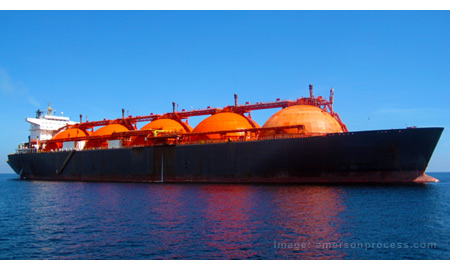Pro-LNG Export Group Urges Chu to 'Think A Little Differently'

A group of 10 Democrat and 34 Republican members of Congress from Arkansas, Louisiana, Oklahoma and Texas on Tuesday sent a letter to Secretary of Energy Steven Chu urging him to expedite the approval process for liquefied natural gas (LNG) export facilities.
"It is time to bring a renewed sense of urgency to the approval process for LNG facilities, which are part of a successful all-of-the-above energy strategy," said U.S. Rep. James Lankford (R-Okla.) in a statement issued jointly with U.S. Rep. Gene Green (D-Texas).
The signatories represent states that have long produced oil and natural gas as well as products refined or manufactured from these fossil fuels for markets elsewhere in the United States. However, with the growth of production from major shale plays from Appalachia to the Rockies, abundant sources of oil and gas are now more widely dispersed domestically.
"[I]ncreased shale production in certain parts of the country require us all to think a little differently about this opportunity and about the need to allow producing areas the ability to seek international customers for a portion of their production," the letter stated.
"The federal permitting process currently stands in the way of energy companies distributing their products in a timely manner," Lankford said in the press release. "Without the ability to market to international customers, this could have a severe impact on production in our region."
"The promise and challenge of this surplus of natural gas is that it has resulted in extremely low prices for natural gas in our country," added Green.
"While this is great for our manufacturing sector, the price has dropped so low that many producers no longer find it economically viable to produce the resource, which could eventually raise the price of natural gas for our manufacturing sector. The approval of strategically located LNG facilities would provide the market opportunities to reincentivize this production while ensuring a stable price and supply for feedstock."
Although the 44-member group expressed gratitude that the Department of Energy has "started to review and issue licenses" for LNG exports, they remarked that DOE's process apparently lacks "a set timeline for decisions or a sense of urgency." "In our collective view, it is time to bring a renewed sense of urgency to the approval process," the letter stated.
On July 16, the DOE issued an updated list of the status of applications for LNG export projects from the Lower 48 States.
The entire Arkansas, Louisiana and Oklahoma House delegations signed the letter. The names of all but four members of the Texas delegation -- Republicans Louie Gohmert and Michael T. McCaul and Democrats Lloyd Doggett and Eddie Bernice Johnson -- appear on the correspondence.
A spokesman for Gohmert said the congressman supports the contents of the letter but was out of the country and unable to sign it.
Rigzone has reached out to the other three officials to obtain their positions on the matter and will post them as they become available.
WHAT DO YOU THINK?
Generated by readers, the comments included herein do not reflect the views and opinions of Rigzone. All comments are subject to editorial review. Off-topic, inappropriate or insulting comments will be removed.
- USA Regional Banks Dramatically Step Up Loans to Oil and Gas
- Oil Markets Were Already Positioned for Iran Attack
- An Already Bad Situation in the Red Sea Just Got Worse
- Valeura Makes Three Oil Discoveries Offshore Thailand
- EU Offers $900MM in Funding for Energy Infrastructure Projects
- Chile's ENAP Says Working on Decarbonization Plan
- Germany to Provide $2.3B Aid for Decarbonization of Industrial Sectors
- Mexico Presidential Frontrunner Plans to Spend Billions on RE, Gas Power
- Macquarie Strategists Warn of Large Oil Price Correction
- JPMorgan CEO Says LNG Projects Delayed Mainly for Political Reasons
- USA, Venezuela Secretly Meet in Mexico as Oil Sanctions Deadline Nears
- EIA Ups Brent Oil Price Forecast for 2024 and 2025
- Petrobras Discovers Oil in Potiguar Basin
- EIR Says Oil Demand Will Not Peak Before 2030
- Biden Plans Sweeping Effort to Block Arctic Oil Drilling
- Pantheon Upgrades Kodiak Estimates to 1.2 Billion Barrels
- Dryad Flags Red Sea 'Electronic Warfare' Alert
- Russian Oil Is Once Again Trading Far Above the G-7 Price Cap Everywhere
- Oil and Gas Executives Predict WTI Oil Price
- New China Climate Chief Says Fossil Fuels Must Keep a Role
- Chinese Mega Company Makes Another Major Oilfield Discovery
- Oil and Gas Execs Reveal Where They See Henry Hub Price Heading
- Equinor Makes Discovery in North Sea
- ExxonMobil Racks Up Discoveries in Guyana Block Eyed by Chevron
- Macquarie Strategists Warn of Large Oil Price Correction
- DOI Announces Proposal for Second GOM Offshore Wind Auction
- Standard Chartered Reiterates $94 Brent Call
- Chevron, Hess Confident Embattled Merger Will Close Mid-2024


